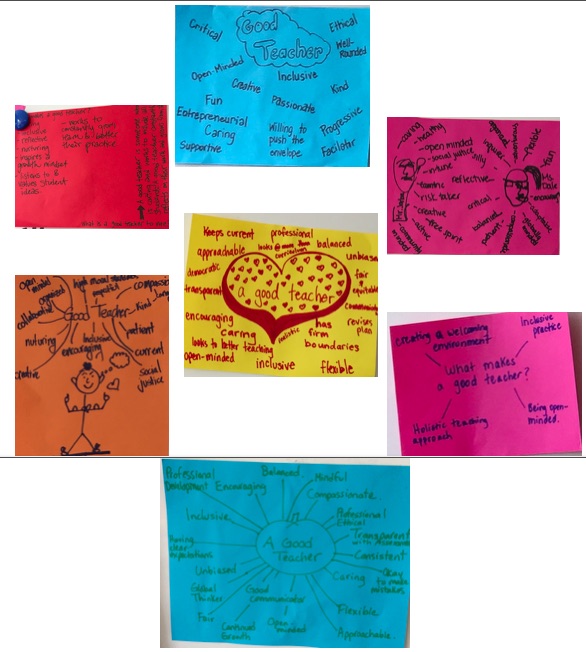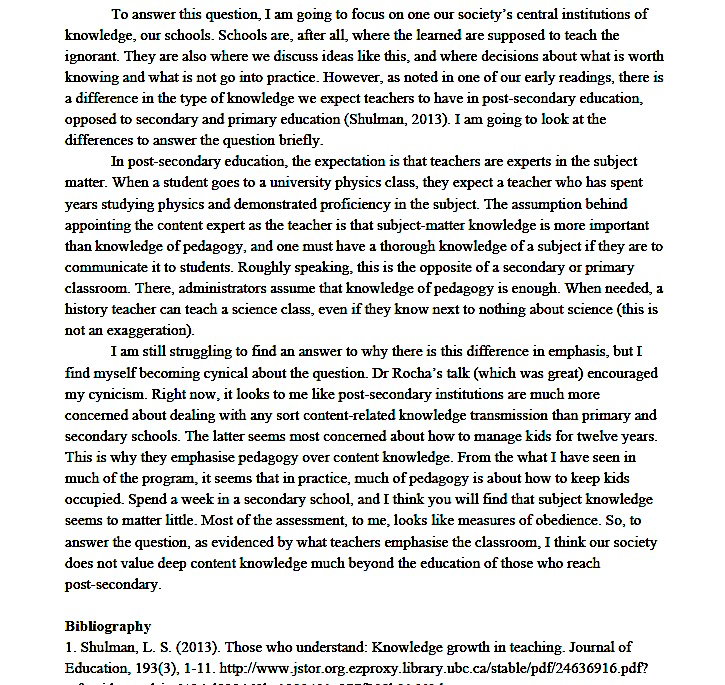Education, schooling, and de-schooling: A personal reflection
By Emilie Boulay
email: emilie2893@gmail.com

I was really interested in Dr. Sam Rocha presentations and readings because I am personally minded with alternative schools and the concept of unschooling. Although, my interest emerges from the problem regarding our contemporary schooling system and view of education. In this text, I will discuss the relation between curriculum, education, and schooling, and also present the different alternatives to these visions.
I share the idea that we confuse frequently the concepts of education and schooling. The word education is overused and loses its meaning because in most cases it is related to the idea of training. Although, I personally think that we need to distinguish between these two concepts and discuss whether schooling in its current form contributes to education. First, I agreed with the following definition of education:
The purpose of education is not to confirm us in some existing version of identity or culture, but to enable us to step outside of it, to view it with fresh eyes, and thus to enrich our experience and enlarge our range of choice (Osborne, 2009).
Schooling should, therefore, be aimed at facilitating the education of people and offering them the opportunity to flourish as an individual and as a group. However, I am aware that this goal is not always achieved in our current schooling system. This is a difficult situation because the objectives and the structure of the education system (curriculum) are influenced by different stakeholders interests which do not always have in mind student development.
To fully understand this relationship, I personally agreed with the theory developed by Bertrand and Valois (1999). Overall, the authors conceive the relationship between education and society in the form of three islands connected by bridges. On the one side, societal organizations (1st island), such as government, ministries, and school boards dictate goals and content (curriculum) that educational organizations (2nd island), as schools, colleges and universities must achieve. On the other side, actors of the local educational community must integrate this curriculum, but still, have some power over their teaching practices (3rd island). Generally, teachers have the freedom to select teaching approaches and strategies, as well as their classroom management, and so on.
The educational paradigm is, in a way, a bridge between the societal paradigm and pedagogical practice. In fact, the schooling organization is characterized both by the ends it pursues and by the activities chosen to actualize these ends. (Free translation, Bertrand and Valois, 1999, p.44)
Despite this freedom, institutional framework constraints remain well and truly present. Teachers are generally trained to teach in a way that respects the institution educational traditions which are intrinsically related to the prevailing societal paradigm. Regarding this aspect, I share the critic of Rocha (2017) which mention that “The instrumental treatment of teachers as mere technicians shows that the schooling-industrial complex of today understands the danger of teaching.” (Rocha, 2017). Teachers have both the most important and the most difficult role in the system at the moment. They have the responsibility to teach “in a meaningful sense”, adapt the curriculum to students’ needs and interests, use a variety of resources and engage students in their learning. Although, the schooling system doesn’t help teachers to achieve these goals.
 Compared to informal education, formal education contains a large number of restrictions, such as conforming to learning objectives, a number of hours envisaged in the program and constraints posed by the establishment. We must deconstruct learning environments and especially teachers and students’ role. Schooling organization and teachers need to ask themselves, “why do we educate?”. School can definitely play a central role in the child’s development, but it can also be a learning inhibitor. In my opinion, “obligation” is part of the problem. Schooling is more of a compulsory life step than a motivating choice. Students should be more critical and aware of their education. They should be engaged and autonomous agents in this process. On this aspect, I think it is where alternative school and unschooling offer interesting educative project.
Compared to informal education, formal education contains a large number of restrictions, such as conforming to learning objectives, a number of hours envisaged in the program and constraints posed by the establishment. We must deconstruct learning environments and especially teachers and students’ role. Schooling organization and teachers need to ask themselves, “why do we educate?”. School can definitely play a central role in the child’s development, but it can also be a learning inhibitor. In my opinion, “obligation” is part of the problem. Schooling is more of a compulsory life step than a motivating choice. Students should be more critical and aware of their education. They should be engaged and autonomous agents in this process. On this aspect, I think it is where alternative school and unschooling offer interesting educative project.
Personally, I want to be more a facilitator than a teacher for my students. In facts, students need to learn how to learn and experimental approaches will help them develop motivation and interest for school. I also have a background in environmental education that convinces me that using outdoor learning and place-based education approach is really crucial in our society. It allows students to create a connection between the school and the community surrounding it.

Bibliographie
Bertrand, Y., & Valois, P. (1999). Fondements éducatifs pour une nouvelle société. Montréal: Éditions nouvelles.
Osborne, K. (2009). Education and Schooling: A Relationship that can Never be taken for Granted. In Why Do We Educate? Renewing the Conversation.
Rocha, S. (2017). Teaching as deschooling (pp. 77-80); In Rocha, S. (2017). Tell them something beautiful: Essays and ephemera. Cascade Books





